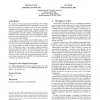Free Online Productivity Tools
i2Speak
i2Symbol
i2OCR
iTex2Img
iWeb2Print
iWeb2Shot
i2Type
iPdf2Split
iPdf2Merge
i2Bopomofo
i2Arabic
i2Style
i2Image
i2PDF
iLatex2Rtf
Sci2ools
VEE
2006
ACM
2006
ACM
A new approach to real-time checkpointing
The progress towards programming methodologies that simplify the work of the programmer involves automating, whenever possible, activities that are secondary to the main task of designing algorithms and developing applications. Automatic memory management, using garbage collection, and automatic persistence, using checkpointing, are both examples of mechanisms that operate behind the scenes, simplifying the work of the programmer. Implementing such mechanisms in the presence of real-time constraints, however, is particularly difficult. In this paper we review the behavior of traditional copy-on-write implementations of checkpointing in the context of real-time systems, and we show how such implementations may, in pathological cases, seriously impair the ability of the user code to meet its deadlines. We discuss the source of the problem, supply benchmarks, and discuss possible remedies. We subsequently propose a novel approach that does not rely on copy-on-write and that, while more ...
Traditional Copy-on-write Implementations | User Code | VEE 2006 | Virtual Machine | Virtualization |
| Added | 14 Jun 2010 |
| Updated | 14 Jun 2010 |
| Type | Conference |
| Year | 2006 |
| Where | VEE |
| Authors | Antonio Cunei, Jan Vitek |
Comments (0)

